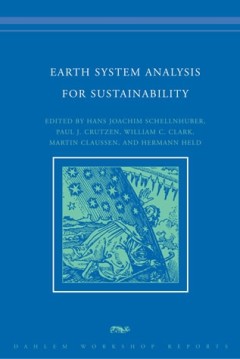Filter by

Wetlands and Water Framework Directive : Protection, Management and Climate C…
This book compares the lessons learned from a wetland-perspective approach to the changing climate and the requirements of the Water Framework Directive (WFD) with regard to environmental conservation. Examples from Germany and Poland are discussed due to the efficiency of their respective implementations of water conservation policies. Although the general scientific interest in specific issue…
- Edition
- -
- ISBN/ISSN
- 978-3-319-13764-3
- Collation
- XI, 103
- Series Title
- GeoPlanet: Earth and Planetary Sciences (GEPS)
- Call Number
- 624 WET

Goods and Services of Marine Bivalves
The aim of this open access book is to review and analyse the goods and services of bivalve shellfish. How they are defined, what determines the ecological functions that are the basis for the goods and services, what controversies in the use of goods and services exist, and what is needed for sustainable exploitation of bivalves from the perspective of the various stakeholders. The book is foc…
- Edition
- 1
- ISBN/ISSN
- 9783319967769
- Collation
- XXV, 591 hlm,: ill, lamp;
- Series Title
- -
- Call Number
- -

Beyond Certification
- Edition
- -
- ISBN/ISSN
- 9781351274128
- Collation
- -
- Series Title
- -
- Call Number
- -
- Edition
- -
- ISBN/ISSN
- 9781351274128
- Collation
- -
- Series Title
- -
- Call Number
- -

Measuring Emission of Agricultural Greenhouse Gases and Developing Mitigation…
This open access book is an outcome of the collaboration between the Soil and Water Management & Crop Nutrition Section, Joint FAO/IAEA Division of Nuclear Techniques in Food and Agriculture, Department of Nuclear Sciences and Applications, International Atomic Energy Agency (IAEA), Vienna, Austria, and the German Science Foundation research unit DASIM (Denitrification in Agricultural Soils: In…
- Edition
- Ed. I
- ISBN/ISSN
- 978-3-030-55396-8
- Collation
- -
- Series Title
- -
- Call Number
- -

Water and Earthquakes
This open access book explores the interactions between water and earthquakes, including recent concerns about induced seismicity. It further highlights that a better understanding of the response of the water system to disturbances such as earthquakes is needed to safeguard water resources, to shield underground waste repositories, and to mitigate groundwater contamination. Although the effect…
- Edition
- -
- ISBN/ISSN
- 978-3-030-64308-9
- Collation
- -
- Series Title
- -
- Call Number
- -

GeomInt–Mechanical Integrity of Host Rocks
This open access book summarizes the results of the collaborative project “GeomInt: Geomechanical integrity of host and barrier rocks - experiment, modeling and analysis of discontinuities” within the Program: Geo Research for Sustainability (GEO: N) of the Federal Ministry of Education and Research (BMBF). The use of geosystems as a source of resources, a storage space, for installing unde…
- Edition
- -
- ISBN/ISSN
- 978-3-030-61909-1
- Collation
- -
- Series Title
- -
- Call Number
- -

Fostering Transformative Change for Sustainability in the Context of Socio-Ec…
This open access book is a compilation of case studies that provide useful knowledge and lessons that derive from on-the-ground activities and contribute to policy recommendations, focusing on the relevance of social-ecological production landscapes and seascapes (SEPLS) to “transformative change.” The concept of “transformative change” has been gaining more attention to deal with today…
- Edition
- -
- ISBN/ISSN
- 978-981-33-6761-6
- Collation
- -
- Series Title
- -
- Call Number
- -

The Life and Afterlife of Gay Neighborhoods: Renaissance and Resurgence
This open access book examines the significance of gay neighborhoods (or ‘gayborhoods’) from critical periods of formation during the gay liberation and freedom movements of the 1960s and 1970s, to proven durability through the HIV/AIDS pandemic during the 1980s and 1990s, to a mature plateau since 2000. The book provides a framework for contemplating the future form and function of gay nei…
- Edition
- -
- ISBN/ISSN
- 978-3-030-66073-4
- Collation
- -
- Series Title
- -
- Call Number
- -

Earth system analysis for sustainability
"Report of the 91st Dahlem Workshop on Earth System Analysis for Sustainabliity, Berlin, May 25-30, 2003"--Page [ii].Earth System Analysis for Sustainability uses an integrated systems approach to provide a panoramic view of planetary dynamics since the inception of life some four billion years ago and to identify principles for responsible management of the global environment in the future. Pe…
- Edition
- -
- ISBN/ISSN
- 9780262310635
- Collation
- 1 online resource (xiv, 454 pages) :illustrations, maps.
- Series Title
- -
- Call Number
- -

Thinking like a Mall: Environmental Philosophy after the End of Nature
A provocative argument that environmental thinking would be better off if it dropped the concept of ""nature"" altogether and spoke instead of the built environment.OCLC-licensed vendor bibliographic record.
- Edition
- -
- ISBN/ISSN
- 9780262326988
- Collation
- 1 online resource (x, 283 pages) :illustrations
- Series Title
- -
- Call Number
- -
 Computer Science, Information & General Works
Computer Science, Information & General Works  Philosophy & Psychology
Philosophy & Psychology  Religion
Religion  Social Sciences
Social Sciences  Language
Language  Pure Science
Pure Science  Applied Sciences
Applied Sciences  Art & Recreation
Art & Recreation  Literature
Literature  History & Geography
History & Geography